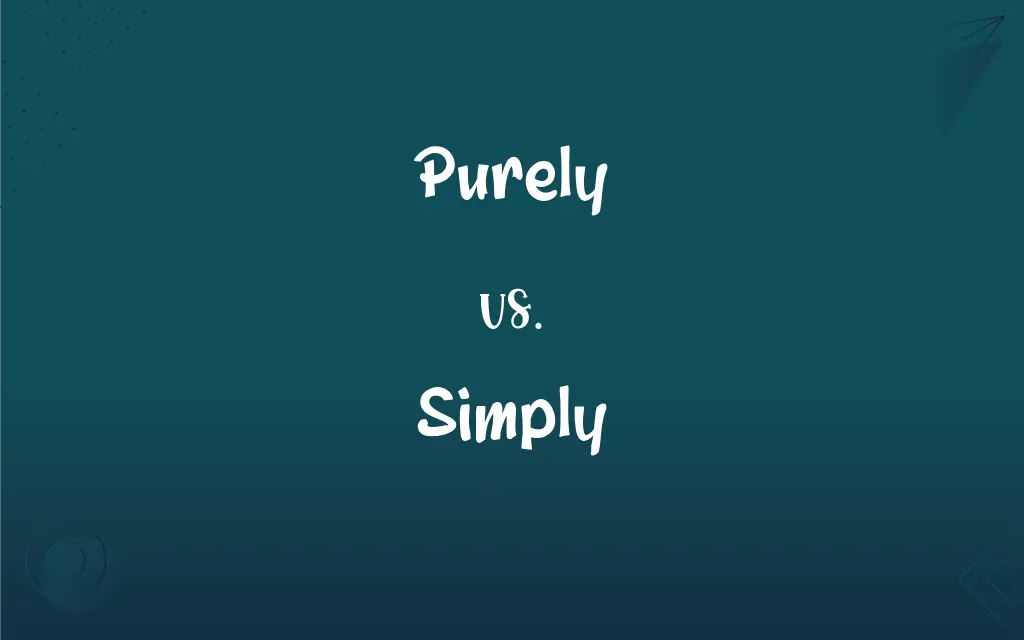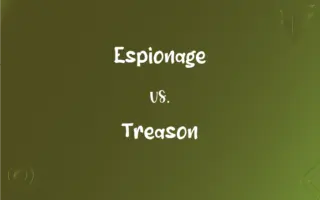Purely vs. Simply: What's the Difference?
Edited by Aimie Carlson || By Janet White || Published on January 21, 2024
Purely refers to something done solely or exclusively with a single purpose or element, whereas simply means in an uncomplicated or straightforward manner.

Key Differences
Purely often carries a connotation of exclusivity or a single-element focus. Simply suggests an approach or method that is uncomplicated and straightforward.
Purely is typically used to emphasize the sole or exclusive nature of something. Simply is often used to describe the ease or lack of complexity in an action or situation.
Using purely in a sentence highlights the singular motive or element involved. Using simply often downplays complexity, suggesting that something is straightforward or easy to understand.
Purely can imply a kind of purity in motive or composition, focusing on one aspect to the exclusion of others. Simply implies simplicity in process or understanding, often suggesting that no more explanation is needed.
When something is described as purely, it can suggest a refined or unadulterated state. Describing something as simply can make it appear more accessible or less daunting.
ADVERTISEMENT
Comparison Chart
Connotation
Exclusivity, single-element focus
Uncomplicated, straightforward
Usage
Emphasizes sole nature
Indicates ease, lack of complexity
Emphasis
Singular motive or element
Ease of understanding or process
Implication
Purity in motive or composition
Simplicity in approach or explanation
Perception
Refined or unadulterated state
Accessible, straightforward
ADVERTISEMENT
Purely and Simply Definitions
Purely
Without any mixture or other elements.
The substance was purely organic.
Simply
Without embellishment or luxury.
They lived simply but happily.
Purely
In a manner free from other influences.
His motivation was purely altruistic.
Simply
In an easy or uncomplicated manner.
He explained the concept simply and clearly.
Purely
Solely or exclusively.
His decision was based purely on facts.
Simply
Merely or just.
It's simply a matter of time.
Purely
For no other reason than.
She attended the event purely out of curiosity.
Simply
Directly or without intermediary.
She simply asked for what she wanted.
Purely
Completely and only.
The research was purely academic.
Simply
Plainly or obviously.
The solution was simply overlooked.
Purely
Having a homogeneous or uniform composition; not mixed
Pure oxygen.
Simply
In a plain and unadorned way
Dresses simply.
Simply
In an unambiguous way; clearly
Explained the concept simply.
FAQs
How does purely affect a statement?
It emphasizes the exclusivity or singular focus of an element.
Is simply used to describe ease?
Yes, it often indicates that something is easy or straightforward.
What does simply suggest about complexity?
It suggests a lack of complexity or a straightforward approach.
What types of decisions are described as purely?
Decisions based solely on one factor or motive.
What does purely mean?
Purely means exclusively or solely, without any other elements involved.
How is simply defined?
Simply means in an uncomplicated or straightforward manner.
Is simply ever used to downplay significance?
Yes, it can be used to downplay the complexity or difficulty of something.
Can purely imply purity in intent?
Yes, it can imply a singular, unadulterated intent or purpose.
Can simply indicate directness?
Yes, it can indicate a direct or straightforward manner.
Can purely be synonymous with only?
Yes, in contexts emphasizing exclusivity or a single aspect.
How is simply used in instructions?
To indicate that the steps or process are straightforward.
Does purely have financial connotations?
Not typically, unless relating to pure economic motives.
Does purely relate to purity of materials?
It can imply that materials are free from other mixtures.
Is simply suitable for professional communication?
Yes, especially to convey clarity or ease of understanding.
What emotions can purely convey?
It can convey a sense of clarity or undiluted purpose.
Is simply used in casual language?
Yes, it's often used in everyday language to indicate simplicity.
How does purely impact the perception of motives?
It can make motives appear more focused or undiluted.
Can purely denote exclusiveness in relationships?
It can, implying a relationship based solely on one factor.
How does simply relate to lifestyle choices?
It can describe a lifestyle that is uncomplicated or minimalistic.
Can simply be used to simplify complex ideas?
Yes, it's often used to make complex ideas more accessible.
About Author
Written by
Janet WhiteJanet White has been an esteemed writer and blogger for Difference Wiki. Holding a Master's degree in Science and Medical Journalism from the prestigious Boston University, she has consistently demonstrated her expertise and passion for her field. When she's not immersed in her work, Janet relishes her time exercising, delving into a good book, and cherishing moments with friends and family.
Edited by
Aimie CarlsonAimie Carlson, holding a master's degree in English literature, is a fervent English language enthusiast. She lends her writing talents to Difference Wiki, a prominent website that specializes in comparisons, offering readers insightful analyses that both captivate and inform.







































































